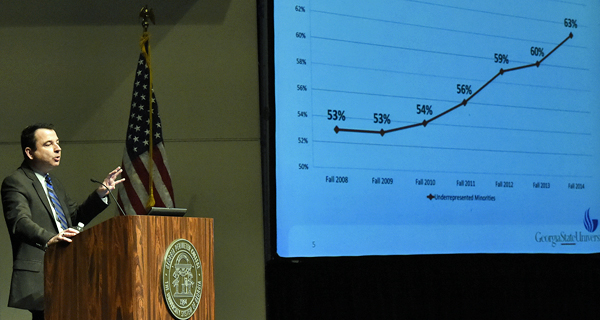
Keynote speaker Dr. Tim Renick, Georgia State University’s vice president for enrollment and student success, discusses initiatives that have helped students stay in school and graduate. (photo by Bill Roa)
Faculty Discipline Day highlights success strategies
Helping students succeed through the use of data, intensive advising and targeted instructional programs was the mantra during Georgia Perimeter College’s 2015 Faculty Discipline Day program Feb. 24.
Keynote speaker Dr. Tim Renick, Georgia State University’s vice president for enrollment and student success, was introduced by GPC interim president Rob Watts as the “Taylor Swift” of higher education and the leading voice in student success. The pop star mantel wasn’t rhetoric: Renick and Georgia State have received attention from the White House for their programs to boost graduation rates over the past five years.
Renick’s initiatives targeting students at risk for dropping out of college have included supplemental instruction, financial aid and meta-major-focused learning communities.
Efforts such as targeted advising alerts through the BANNER system, the use of predictive analytics for student success in chosen majors, the university’s “Keep HOPE Alive” program and a financial grant program have helped improve student success, says Renick.
“We were losing students who came in with the HOPE scholarship but lost it; they represented a 40 percent drop in graduation rates,” Renick says.
The “Keep HOPE Alive” campaign gives eligible students a $500 grant for two semesters. That assistance, coupled with supplemental instruction and financial literacy programs, helps keep them on track.
“Our goal was to get them the HOPE scholarship back,” he says. “In the past, before the program, just 9 percent of students regained their HOPE; in the past four years, almost 60 percent of these students got their scholarships back through this program—and graduated.”
Many students were not failing academically, but the loss of their financial aid made it economically hard for them to continue, Renick says. “We saw students [dropping out] at the end of their senior years who were academically on track, but ran out of HOPE eligibility or their Pell grants.”
The university started micro-grant programs that helped seniors who had maxed out of their Pell grant eligibility and were at risk of dropping out because of finances. “These were students who just needed that little boost to be able to graduate,” Renick says.
Besides offering financial incentives, Georgia State developed a real-time advising system in BANNER that is updated nightly using predictive analytics to ensure students are enrolled in the right courses for their major and that they are being advised correctly.
The program is geared to the “large group of students in the middle who do not normally come in for advising and wouldn’t appear to be at risk,” says Renick. Students who get a B or C as their first grade of their first course are immediately flagged in the BANNER system.
“In the past, we were sitting back and waiting until they took upper level courses,” Renick says. “By that time, they were usually stymied from their chosen major because of their grades. We realized, that that first C grade means the students need help before they get to the more difficult material.”
Also presenting during the morning session in the Clarkston Campus Cole Auditorium was GPC sociology professor Dr. Amanda Damarin and GPC English professor Dr. Katherine Perry. The two introduced GPC’s upcoming master faculty advising and cluster advising programs. A 24-member advising team has developed recommendations to help students stay on track at GPC. Damarin notes that the master faculty advising program meshes with Georgia State’s new advising structure as well. Faculty interested in more information can contact Dr. Donald Pearl at Donald.pearl@gpc.edu.
